
Have you ever wondered if stress sharpens the ability of your mind, or if it saps your ability to think clearly? Maybe you’re trying to justify the chronic stress in your life. Maybe you’re looking for a way to be more productive. Or maybe you’ve heard stress can be both good and bad for you and you’re not sure what to believe.
Stress & Adrenal Fatigue
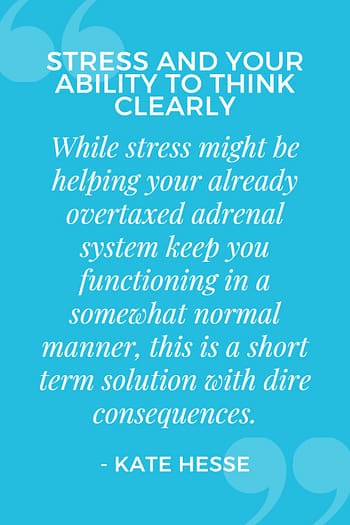 For so many years I thought stress was what motivated me and kept me going. And in part, it was.
For so many years I thought stress was what motivated me and kept me going. And in part, it was.
During the years I was running on absolute empty, when I was teetering on the brink of adrenal fatigue, the stress kept my body pumping out the adrenaline I needed to even get out of bed in the morning.
If you’re in this situation, while it might be hard to hear, your body will reach a point when it just won’t be able to produce enough stress hormones to keep you going anymore. And that’s when no matter how stressed you are, you still won’t have the energy to get out of bed.
So let’s be clear, while stress might be helping your already overtaxed adrenal system keep you functioning in a somewhat normal manner, this is a short term solution with dire consequences.
AND, even if your stress is getting you moving, it isn’t sharpening your mind. It’s doing the exact opposite.
Is there such a thing as good stress?
But before we talk about the impact of stress on your mental abilities, it’s important to differentiate between stress and eustress. Now would be a great time to grab this week’s worksheet – you can get it using the form below.
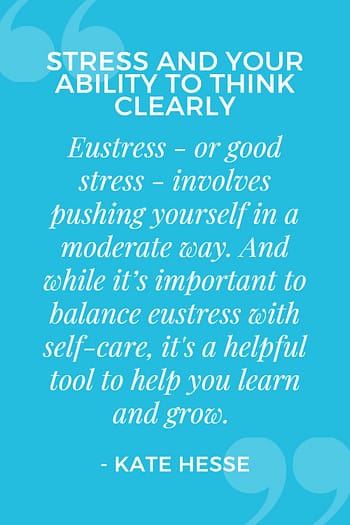 Stress is what we normally think of when we use the word. It’s the worried thoughts that swim through your head when you have a quiet moment. Stress is the pressure you put on yourself to be or do something you’re not comfortable with.
Stress is what we normally think of when we use the word. It’s the worried thoughts that swim through your head when you have a quiet moment. Stress is the pressure you put on yourself to be or do something you’re not comfortable with.
According to the American Psychological Association, “stress involves changes affecting nearly every system of the body, influencing how people feel and behave. By causing mind–body changes, stress contributes directly to psychological and physiological disorder and disease and affects mental and physical health, reducing quality of life.”
But maybe you’ve heard that stress can actually be good for you. When used in this context, what people are really talking about is eustress. This word is derived from Greek and means “good stress”. Often when talking about eustress, “bad stress” like we just talked about is referred to as distress.
Eustress involves pushing yourself in a moderate way that allows you to learn and grow in some way. And while it’s important to balance eustress with self-care, it is a helpful tool to help you learn and grow.
Understanding the difference between stress & eustress
Let’s look at an example.
Think about working out. If you’ve set a goal to get stronger, you need to add weight bearing activities to your exercise routine.
Let’s first imagine you add in weights that are enough to tax your muscles during each rep, but not so much you can’t maintain form throughout your workout. Each time you use these weights, you create micro tears in your muscles. You then feed your body the nutrition it needs, offer it rest, and as those micro tears are repaired, your muscle gets stronger. Over time you’re able to life more and more weight.
Boiled down to the basics, you need to put your body under some stress (in this case eustress) in order to get stronger.
Now imagine you walked into the gym and saw someone deadlifting 100 pound plates. Chances are trying to start your exercise routine with something like that will result in tearing muscle or ligament, a major injury that will take A LOT of time to heal from. Perhaps you’ll need surgery. And you definitely won’t be back at the gym any time soon.
In this case, by not listening to your limits, you’ve crossed the line into distress and caused damage to your body.
So how do you know the difference?
In my yoga classes, I tell students that if the sensation is dull, broad, or achy, they’re probably right at their edge and it’s safe to hold that pose. However, if the sensation is sharp, pinching, or painful, they’ve gone too far and need to back out of the pose.
Now let’s take this off the mat and out of the gym. Hosting live webinars is something that always makes me nervous. It’s outside my comfort zone, and I always worry about the technology doing something crazy.
And yet, I continue to show up and host live webinars and workshops. I experience eustress leading up to the workshop – I’m stepping out of my comfort zone, but in a way that helps me learn and grow. By the end of the session, the metaphorical micro-tears in my comfort zone have been filled in with newfound confidence!
Key characteristics of stress & eustress
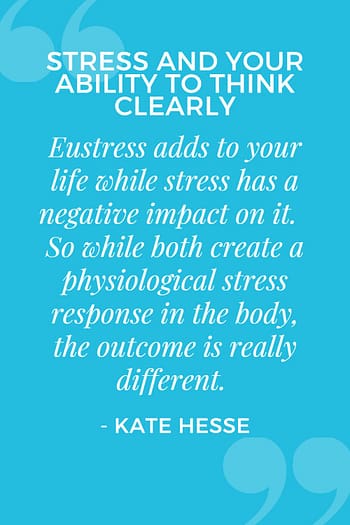 This distinction between eustress and stress can be applied in all aspects of your life. Here are a few things to look for when you’re distinguishing eustress from stress.
This distinction between eustress and stress can be applied in all aspects of your life. Here are a few things to look for when you’re distinguishing eustress from stress.
Eustress is short-term, stress is often chronic or habitual. Additionally, eustress is marked by moderation while stress is often extreme, or something you might label as “too much”.
Eustress is a positive challenge where you can see a direct tie to something that will help you learn and grow. Stress is connected to something that threatens us. A few days after a eustress experience, you’ll be able to identify some way in which it’s enhanced your life. A few days after a stress experience, you’ll feel like it’s had a negative impact on your life.
So if you came into this episode thinking stress was a good thing, do a quick review – were those situations and experiences that have helped you stress, or are they actually eustress? While both will create a physiological stress response in the body, the outcome is really different.
Which leads us to the conversation about your nervous system.
The role of your nervous system in the stress response
When you get stressed whether it’s because you’re in an actual life or death situation, or you’re running late for work your body responds the same way. Our technology has evolved MUCH faster than our physiology, so your nervous system reacts to all stress as if you were coming face to face with a hungry bear or lion who wanted to make you dinner.
Your fight, flight, or freeze response
When you get stressed, it triggers your body to shift into a sympathetic nervous system response. This is a great place to be if you’re in a life or death situation. It’s often referred to as the fight, flight, or freeze response. Your resources move to your extremities to prepare you to physically protect yourself. Your heart and respiration rates increase, and your body is flooded with stress hormones that give you an advantage in physically difficult situations – think of stories of a mom lifting a car off their child.
BUT, in order to mount this response, your body needs to divert resources from systems it views as less essential. That means it sidelines your digestive, reproductive, and immune systems among others. If you get eaten by the bear or a lion, it doesn’t really matter if you finish digesting your lunch. And if you escape the danger, you can digest once you’re safe.
The impact of stress on your brain
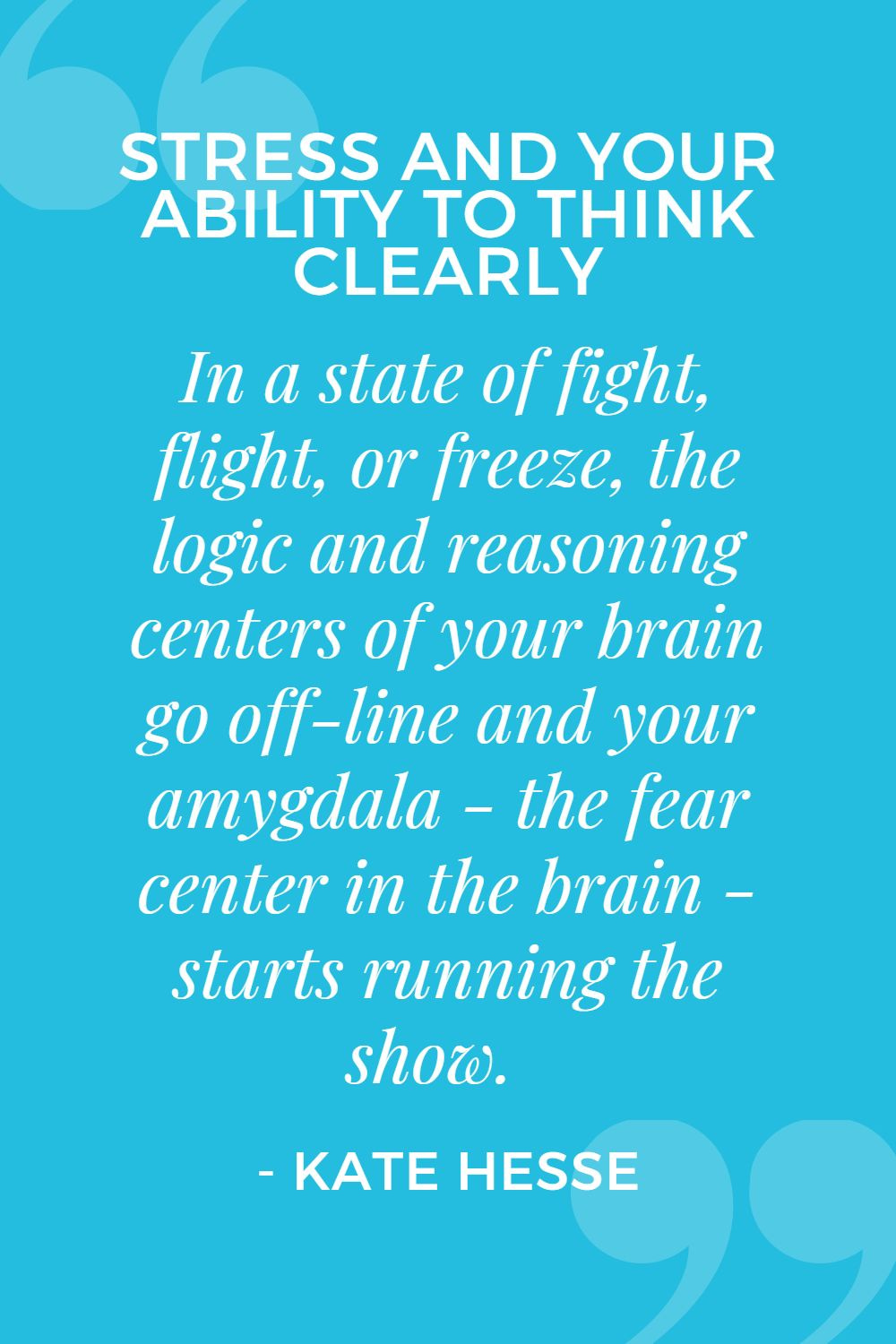 All of this explains what happens physically and why chronic stress can be so unhealthy, however, today’s question is about clear thinking.
All of this explains what happens physically and why chronic stress can be so unhealthy, however, today’s question is about clear thinking.
So let’s talk about the impact of the stress response on the brain. During sympathetic nervous system response – your fight, flight, or freeze response, the logic and reasoning centers of your brain go off-line and your amygdala – the fear center in the brain – starts running the show.
Your amygdala responds based on instinct and it’s sole goal is your survival. It isn’t interested in helping you thrive, but is happy to have you merely survive.
What this means is that when you’re stressed, you’re actually LEAST able to think clearly.
So if you’re looking to improve your mental clarity, the answer is to stress less. But I know when you’re already stressed, the idea that you need to simply “stress less” can actually ADD to your stress, not reduce it.
And the last thing I want to do is add more stress to your life. So let’s talk about tools and techniques you can incorporate into your day to reduce your stress and help you get to that goal of thinking clearly.
Using your nervous system to enable clear thinking!
Let’s go back to your physiology. In optimal conditions, once you escape the bear or lion and are safe, your body shifts out of the sympathetic and into the parasympathetic nervous system. This is your rest and digest mode.
In the parasympathetic nervous system state, you see the reverse of what happened during the sympathetic nervous system response – your stress hormones decrease, heart and respiration rates slow, resources get pulled back to the digestive, reproductive, and immune systems, and your logic and reasoning center in the brain comes back online.
So if we want to be in tip top shape for mental challenges, it becomes clear we need to be in the parasympathetic nervous system state – or rest and digest. However, just like saying stress less isn’t really actionable, you also can’t just decide to shift your nervous system.
The power of your breath
While most of the systems in our body – including our nervous system are autonomic and we can’t “think” them into functioning differently, our respiration is something we do have control over.
And since the rate and way we breathe changes depending on our nervous system state, we can use our breathing to signal the body to move out of a stress response.
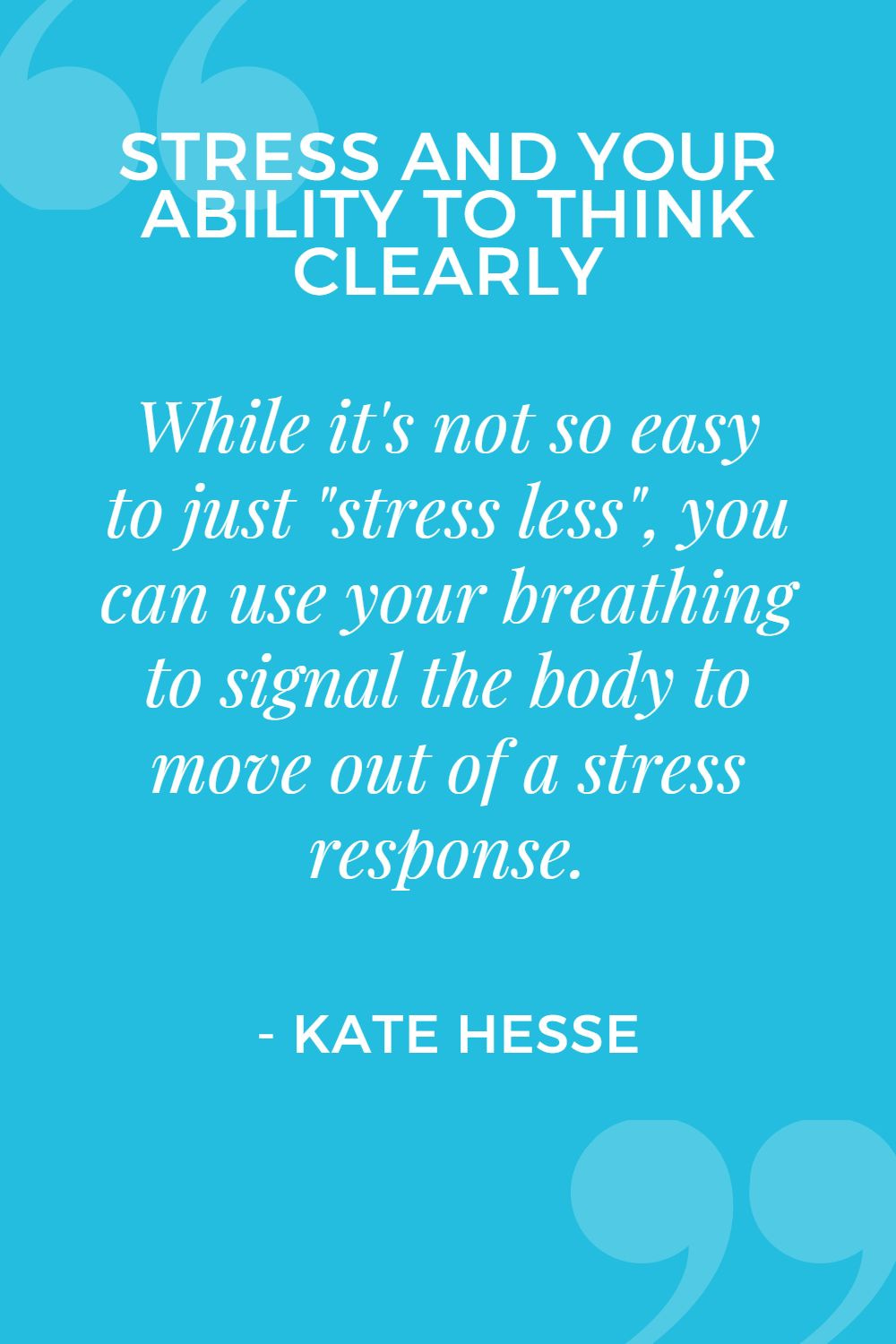 Think for a moment of how you breathe when you’re stressed out – it’s usually shallow and rapid. We breathe quickly and usually only into the upper portion of our chest.
Think for a moment of how you breathe when you’re stressed out – it’s usually shallow and rapid. We breathe quickly and usually only into the upper portion of our chest.
Now think about how you breathe when you’re relaxed – perhaps right before you fall asleep or when you’re on vacation. Those are deeper, slower breaths. We breathe down into our belly.
So if you want to sharpen your mind, the secret is in controlling your breath.
And while we could talk about breathing techniques for months, I want to share two of my favorites which are easy to get started with and can be worked into your schedule no matter how busy you are!
The audible exhale
The first is the audible exhale. This is actually the first thing I offer to most of my clients. It’s simple, it’s powerful, and it only takes a minute or two. And I’ve shared it with you before, we used the audible exhale in episode 6 of the podcast to reduce stress before tackling our to-do lists.
To practice the audible exhale, you take a long slow inhale through your nose and then let the breath out of your mouth with an audible ahhhhh. This sound is like the sound you’d make sinking into a warm bath or when someone starts massaging your shoulders after a long day. Not the sound you make when you’re exasperated and can’t stand something for one more minute.
Take a moment to note your current stress level. Now let’s take three audible exhales together.
Take another moment to check in with your stress level again – has it changed?
The audible exhale is a powerful trigger to signal to your body it’s safe and it can begin to shift out of fight, flight, or freeze and into rest and digest mode.
Sama Vritti – or Even Breath
Another technique I love is sama vritti – which translates from Sanskrit as same or even awareness or consciousness. With this technique we take slow conscious inhales through the nose and slow conscious exhales through the nose. We match the length of the inhale and the exhale.
You can also use this technique with breath retention, although if you’re already experiencing stress and anxiety, breath retention can amplify those emotions rather than calm you down, so if you’re new to this technique, I encourage you to omit any breath retention.
Take a moment to inhale and exhale, count how long each is. Perhaps you inhale for a count of three and exhale for a count of four. Begin your breathwork practice with an inhale for a count of four and an exhale for a count of four. If that feels comfortable, continue increasing one count each on the inhale and exhale.
The focus isn’t about how long you can make your inhales and exhales, but rather how slow, relaxed, and fluid you can make your inhales and exhales. If you feel like you’re straining on either, reduce your count until they again become comfortable.
Just like with the audible exhales, you want to feel the breath move down into your belly and fill up your body. Get curious – how deep can you get your breath to go? What is a comfortable breathing rate for you today? And are you more comfortable with the inhales or the exhales? This isn’t about judging – there’s no right or wrong, it’s simply about being present in the moment as you practice this technique.
Reducing the impact of stress on your ability to think clearly
So in conclusion, stress does in fact sap your ability to think clearly by triggering the sympathetic nervous system response. And while eustress can help us grow, stress, or distress, actually holds us back at best and has long term negative effects when it becomes chronic. Grab the worksheet for this week’s episode below for help understanding what in your life is stress and what’s eustress.
If you’re working on something that requires clear thinking, and you feel stress creeping up on you, try one of the two breathwork techniques we covered today. You can listen along with the guided recordings above until they become second nature to you.
I’m curious – what was the biggest takeaway for you from this episode? I’d love to know – you can send me an email at kate@nourishnestbreathe.com and share what hit home for you.
And remember – living your best life isn’t about changing your life – it’s about changing the way you show up for your life!
Show Notes
Additional Resources
Learn more about your Nervous System.
Schedule a Discovery Session with me.
Submit your question to be featured on a future episode.
Related
4 thoughts on “The insidious impact of stress on your clear thinking!”
Leave a Reply Cancel reply
This site uses Akismet to reduce spam. Learn how your comment data is processed.
[…] worried – about the past or the future – it sets off a stress response. Remember the amygdala – the fear center in your brain – this stress response triggers it to jump into action […]
[…] the stress of being face-to-face with a hungry bear. We talked a lot about the stress response in Episode 8 of the podcast. If you need a refresher, go back and check out that episode. But in a nutshell, […]
[…] life. BUT when they begin to feel overwhelmed by everything on their plate, they can take three audible exhales, ground into their feet, or practice the mindful […]
[…] talked about this before – but the unknown can be a great way to trigger your stress response. Your amygdala – […]